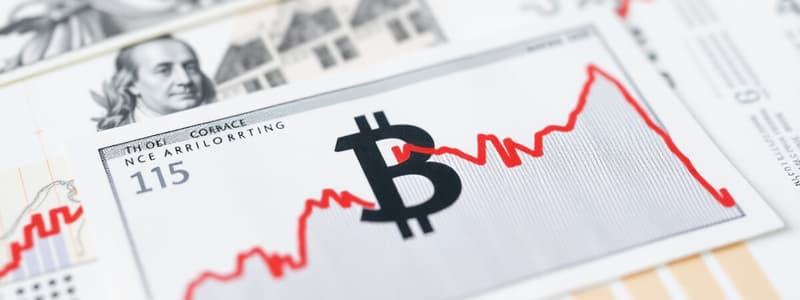Podcast
Questions and Answers
The calculation of derivatives values is based on an assumption that:
The calculation of derivatives values is based on an assumption that:
- investors are risk neutral.
- arbitrage opportunities do not arise in real markets.
- arbitrage opportunities are exploited rapidly. (correct)
A net benefit from holding the underlying asset of a forward contract will:
A net benefit from holding the underlying asset of a forward contract will:
- decrease the value of the forward contract at expiration.
- increase the value of the forward contract during its life.
- decrease the no-arbitrage forward price at initiation. (correct)
Costs of holding the underlying that are greater than benefits from holding the underlying will:
Costs of holding the underlying that are greater than benefits from holding the underlying will:
- decrease the no-arbitrage forward price.
- have no effect on the no-arbitrage forward price.
- increase the no-arbitrage forward price. (correct)
Other things equal, an increase in storage costs of the underlying asset will:
Other things equal, an increase in storage costs of the underlying asset will:
Which of the following is most likely to increase the no-arbitrage forward price of an asset?
Which of the following is most likely to increase the no-arbitrage forward price of an asset?
It is possible to profit from arbitrage when there are no costs or benefits to holding the underlying asset and the forward contract price is:
It is possible to profit from arbitrage when there are no costs or benefits to holding the underlying asset and the forward contract price is:
Other things equal, the no-arbitrage forward price of an asset will be higher if the asset has:
Other things equal, the no-arbitrage forward price of an asset will be higher if the asset has:
For an underlying asset that has no holding costs or benefits, the no-arbitrage forward price at initiation of a forward contract is:
For an underlying asset that has no holding costs or benefits, the no-arbitrage forward price at initiation of a forward contract is:
Flashcards
Derivatives Valuation Assumption
Derivatives Valuation Assumption
Derivatives valuation assumes rapid exploitation of arbitrage opportunities, forcing assets with identical cash flows to converge in price.
Net Benefit Impact
Net Benefit Impact
A net benefit decreases the no-arbitrage forward price at initiation and the value during its life.
Cost vs. Benefit Impact
Cost vs. Benefit Impact
When costs outweigh benefits, the no-arbitrage forward price will be higher than without costs/benefits.
Increased Storage Costs
Increased Storage Costs
Signup and view all the flashcards
Lower Convenience Yield
Lower Convenience Yield
Signup and view all the flashcards
Arbitrage Condition
Arbitrage Condition
Signup and view all the flashcards
Forward Price Factors
Forward Price Factors
Signup and view all the flashcards
No-Arbitrage Forward Price
No-Arbitrage Forward Price
Signup and view all the flashcards
Study Notes
- Derivative values are calculated assuming arbitrage opportunities in financial markets are exploited rapidly.
- Exploitation of arbitrage forces assets with equivalent cash flows towards the same price.
Net Benefit of Holding an Underlying Asset
- Net benefits from holding the underlying asset of a forward contract will decrease the no-arbitrage forward price at initiation.
- It'll also decrease the value of the forward contract during the contract's life.
- Holding costs and benefits have no effect on the value of a forward contract at expiration.
Costs vs Benefits of Holding an Underlying Asset
- When costs of holding an underlying asset are greater than the benefits, the no-arbitrage forward price is higher than without these costs or benefits.
Impact of Increased Storage Costs
- Other factors being constant, increased storage costs for an underlying asset will increase the no-arbitrage forward price.
Factors Increasing No-Arbitrage Forward Price
- A decrease in benefits or an increase in costs related to holding an underlying asset would increase the no-arbitrage price of a forward contract.
- Lower convenience yield for a commodity can increase the no-arbitrage forward price of an asset.
Arbitrage Opportunities
- If there are no costs or benefits to holding the underlying asset, an arbitrage opportunity is possible if the forward price is less than the future value of the spot price.
- Arbitrage exists where the forward price does not equal the future value of the spot price, compounded at the risk-free rate over the forward contract's period.
Impact of Costs and Benefits on No-Arbitrage Forward Price
- The no-arbitrage forward price of an asset will be higher given storage costs.
- Benefits from holding the asset, like dividends or convenience yield, will decrease its no-arbitrage forward price.
No-Arbitrage Forward Price at Initiation
- With an underlying asset that has no associated holding costs or benefits, the no-arbitrage forward price at the initiation of a forward contract equals the spot price.
- At initiation, with no holding costs or benefits, the no-arbitrage forward pricing is the future value of the spot price, compounded at the risk-free rate to expiration: Fo(T) = S0(1 + Rf)T.
- If the forward price in the contract equals the no-arbitrage forward price the forward contract has a value of zero at initiation.
Studying That Suits You
Use AI to generate personalized quizzes and flashcards to suit your learning preferences.




